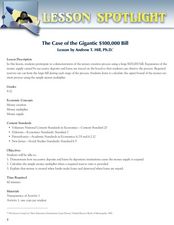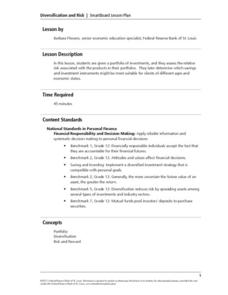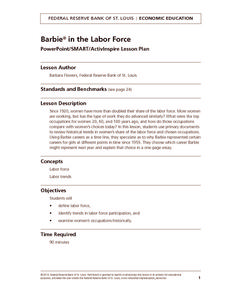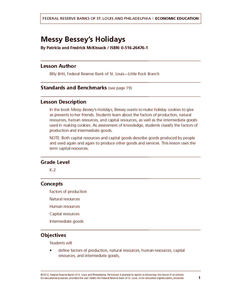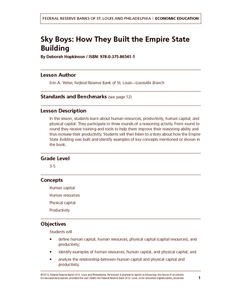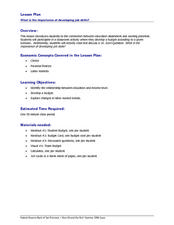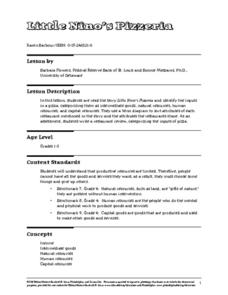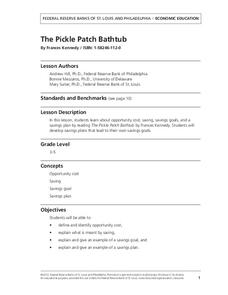Curated OER
iCivics: State Government
Students explore the role of state government. In this civics lesson, students play an online game that requires them to consider the needs of state residents and the structure of state government.
Curated OER
Native or Not?
In this Ranger Rick activity, students read a Ranger Rick articles and complete a graphic organizer that requires them to compare invasive and native species. The article is not included.
Curated OER
The Case of the Gigantic $100,000 Bill
Students investigate the money creation process and calculate the upper bound of the money creation process using a money multiplier. In this money creation lesson, students use a imitation $100,000 bill. Students demonstrate successive...
Curated OER
A Study in Paper Permanence
Twelfth graders compare the permanence of papers by testing pH, determining presence of alkaline reserve as well as fold endurance, and testing lignin content.
They indicate the strength by using a starch test as a comparison.
Federal Reserve Bank
Diversification and Risk
After being given a portfolio of investments, your young economists will learn how to assess the relative risk of the portfolio's products and understand the importance of diversification, relating these economic concepts to real-life...
Federal Reserve Bank
Barbie in the Labor Force
How have the women's share of the labor force and chosen occupations evolved in the United States over the last century? Using census reports, graphs detailing the gender makeup of the labor force, and analysis of the careers of Barbie...
Federal Reserve Bank
The Free Silver Movement and Inflation
Why are US dollars no longer backed by gold and silver? What is our medium of exchange, and what would it be like to live in a barter economy? Learners consider these questions, as well as learn about the major historical events in the...
Federal Reserve Bank
Messy Bessey's Holidays
Teach your class some fairly complex terms—factors of production, human resources, capital resources, natural resources, and intermediate goods—with a storybook (Messy Bessey's Holidays), plenty of visuals and handouts, and related...
Federal Reserve Bank
Sky Boys: How They Built the Empire State Building
How tall is the Empire State Building? Lead your class through a collaborative estimation activity to determine the number of quarters it would take to reach the top and teach the following concepts: human capital, human resources,...
Curated OER
What is the Importance of Developing Job Skills?
Financial literacy is the way to teach! The class works in small groups to discover the relationship between education and income level. They use their math and problem-solving skills to complete two different activities. They work out a...
Federal Reserve Bank
Creditors’ Criteria and Borrowers’ Rights and Responsibilities
Discover what criteria creditors use for making loans (the 3 Cs of Credit), and impress upon your young adults the rights and responsibilities related to using credit. Pupils role play as individuals seeking or providing credit, as well...
Federal Reserve Bank
Invest in Yourself
What are the different ways that people can invest in their human capital for a better future? Pupils participate in an engaging hands-on activity and analyze data regarding unemployment, the ability to obtain an education, and median...
Federal Reserve Bank
Cash the Check and Track the Dough
From checking and savings accounts to learning the importance of maintaining records and balancing a bank account, prepare your learners to become financially independent and savvy adults, and explore all the intricacies of owning a bank...
Federal Reserve Bank
Your Budget Plan
What do Whoosh and Jet Stream have in common? They are both characters in a fantastic game designed to help students identify various positive and negative spending behaviors. Through an engaging activity, worksheets, and discussion,...
Federal Reserve Bank
Credit Reports—and You Thought Your Report Card Was Important
Get the facts about credit and take a close look at what factors into a consumer credit report with this fantastic lesson. Your pupils will read informational texts, read sample financial documents, and discuss the advantages and...
Federal Reserve Bank
So How Much Are You Really Paying for that Loan?
Loans are rarely provided without a cost. Pupils evaluate the high cost of using a payday loan or payday advance through discussion and worksheets, and finally work in groups to develop short public service announcements that outline the...
Curated OER
A Lesson To Accompany "The First Bank of the United States: A Chapter in the History of Central Banking"
Here is an interesting topic. Learners examine the economics that led to the founding of the First Bank of America. They participate in a reader's theater experience depicting the debate between Alexander Hamilton and Thomas Jefferson...
Federal Reserve Bank
Little Nino's Pizzeria
Engage your youngsters in basic economics by connecting the terms to dessert and pizza! After a discussion about intermediate goods and natural resources, learners read and connect a pizzeria to economic terms.
Federal Reserve Bank
Beatrice’s Goat: A Lesson on Savings Goals
Youngsters learn the meaning of saving and how to reach savings goals by first reading a story of a young Ugandan girl who is gifted a goat, and then discovering the opportunity costs of savings decisions made by her and her family.
Federal Reserve Bank
Bunny Money
Teach your class about saving, spending, and goal setting with a story about a couple of bunnies who went shopping and related activities. Learners keep track of the bunnies' spending, practice identifying long- and short-term savings...
Federal Reserve Bank
Less Than Zero
Perry the penguin wants to buy a new scooter, but he doesn't have any funds! Walk your kids through the short book Less Than Zero, and have them track his borrowing, spending, and saving on a line graph while you read. Pupils will learn...
Federal Reserve Bank
The Pickle Patch Bathtub
What do your pupils want to save up their money for? Based around the book The Pickle Patch Bathtub, this lesson covers opportunity cost, saving, and spending. Learners participate in a discussion and practice making their own savings...
Federal Reserve Bank
Keep the Currency
Each day, people throw currency away in different ways because of a lack of financial knowledge. Introduce your learners to the importance of financial literacy and assess their understanding of banking and personal finance.
Federal Reserve Bank
Government Spending and Taxes
What types of government programs are designed to improve economic inequity in the United States? Introduce your learners to government programs, such as low-income housing, Social Security, and Medicaid, how they work to improve...




